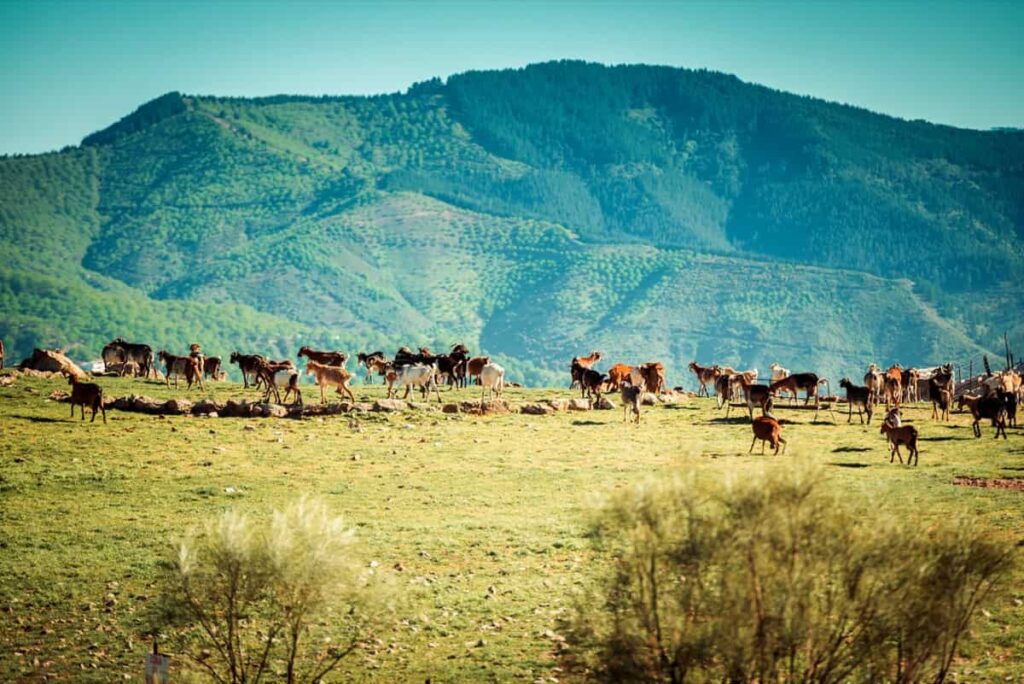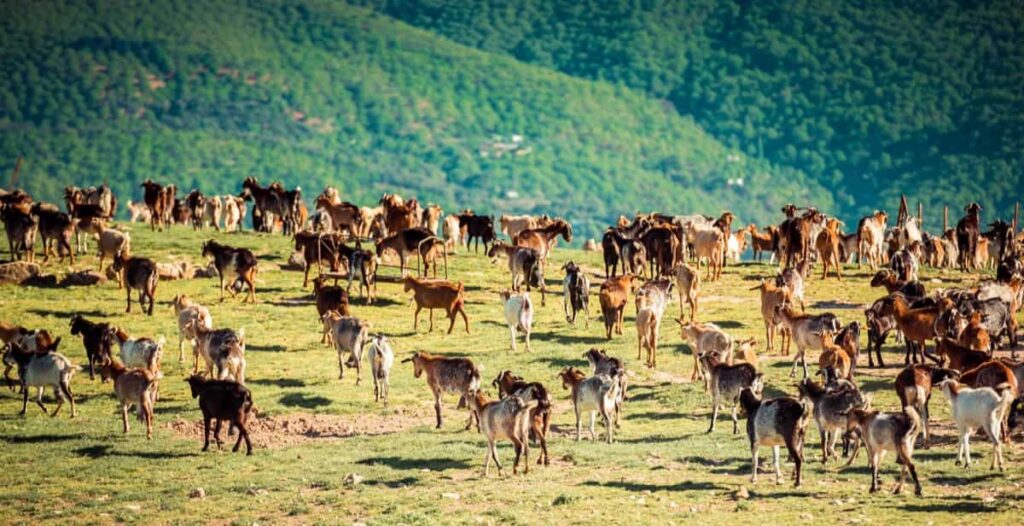The Sirohi goat, originating from the Sirohi District of Rajasthan in northwestern India, is a remarkable breed that has gained popularity for its dual-purpose capabilities. As a domestic breed, it efficiently serves meat and milk production needs.

Benefits of Sirohi Goat Farming
- Suitable housing facilities and adequate feeding management are crucial to ensure optimal growth and well-being. Qualified professionals should also conduct regular health check-ups to prevent potential diseases or infections.
- Sirohi goats have gained recognition for their superior qualities. They are known for their excellent fertility rates, high disease resistance, and ability to thrive on minimal resources.
- The popularity of Sirohi goats has increased significantly over the years. They are now bred in Rajasthan and other parts of India and even exported to countries worldwide.
- These incredible animals have played a vital role in sustaining rural communities by providing valuable meat and dairy products.
Housing Requirement for Raising Sirohi Goats
- These animals need a comfortable and secure space to thrive and stay healthy. Make sure the housing structure is sturdy and well-ventilated. Adequate airflow prevents respiratory issues and keeps the goats comfortable.
- Next, provide enough space for each goat to move around freely.
- Consider installing separate areas within the shelter for feeding, resting, and kidding purposes.
- A strong fence will keep your Sirohi goats safe from predators while allowing them sufficient grazing space if you have an outdoor enclosure.
Characteristics of Sirohi Goats
The Sirohi goat breed is known for its unique and distinct characteristics, making it a popular choice among farmers. These goats are medium-sized, with males weighing around 50 kg and females weighing approximately 23 kg. They have a strong and sturdy build, which enables them to withstand the harsh climatic conditions of Rajasthan.
One of the standout features of Sirohi goats is their beautiful appearance. They come in various colors, from light brown to dark brown or black. Their coats are short and smooth, making them low maintenance for grooming. Sirohi goats are known for being docile and easy to handle.
This makes them suitable for both small-scale backyards farming as well as large commercial farms. Despite their gentle nature, they possess remarkable adaptability and resilience. The distinctive characteristics of Sirohi goats make them an ideal breed for farmers seeking a dual-purpose animal that excels in milk and meat production capabilities while being adaptable to varying environmental conditions.
Information About Sirohi Breed
| Breed Name | Sirohi |
| Weight | Male – 50 kg, Female – 23 kg |
| Height | Male – 86 cm, Female – 68 cm |
| Horns | Yes |
| Climate Tolerance | Heat |
| Coat Color | Mainly Brown |
| Good for Stall Fed | Yes |
| Rarity | Common |
| Lifespan | 15-18 years |
| Country of Origin | India |
In case you missed it: Sojat Goat Farming: Breed Profile Information Guide

Advantages of Keeping Sirohi Goats
- These goats are known for their high adaptability to the dry tropical climate of Rajasthan. This makes them a resilient breed that can thrive in harsh environments.
- Sirohi goats are dual-purpose animals that can be raised for meat and milk production.
- In addition, Sirohi goats have excellent reproductive capabilities. They reach sexual maturity at an early age and have a high fertility rate.
- Furthermore, Sirohi goats require relatively low maintenance compared to other livestock options. They are hardy animals that do not require extensive medical attention or specialized care.
- The market demand for Sirohi goat products is steadily increasing domestically and internationally.
Sirohi Goat Milk Production
On average, each female Sirohi goat yields about 0.5 to 0.7 kg of milk daily. This makes them a great choice for dairy farmers looking to maximize their milk production capacity. Proper care and management are crucial to ensure optimal milk production from your Sirohi goats.
Sirohi Goat Weight
On average, a mature male Sirohi goat weighs around 50 kilograms, while the females weigh approximately 23 kilograms. The weight of these goats is influenced by various factors such as genetics, diet, and management practices. Proper nutrition is vital to ensure healthy growth and development in Sirohi goats.
Feeding and Management Tips for Raising Sirohi Goats
- Provide a balanced diet of green fodder, dry roughage, and concentrate feed. Ensure that they have access to clean water at all times.
- Allow your goats to graze on open pasture during the day. This will provide them with natural forage and exercise.
- Maintain cleanliness in the goat shed by regularly removing manure and providing fresh bedding material.
- Follow a proper vaccination schedule a veterinarian recommends to prevent common diseases among Sirohi goats.
- Schedule regular veterinary check-ups for your goats to identify any health issues early on and take necessary measures promptly.
Tips for Raising Sirohi Goats
- Caring for Sirohi goats is essential to ensure their well-being and productivity. Providing a suitable housing environment is crucial. Sirohi goats require a dry and clean shelter that protects them from extreme weather conditions. Make sure the shelter has good ventilation and adequate space for each goat.
- Feeding plays a vital role in maintaining the health of Sirohi goats. A balanced diet consisting of fresh green fodder, grains, and mineral supplements should be provided regularly. Ensure access to clean drinking water at all times.
- Regular veterinary check-ups are necessary to monitor the overall health of your herd. Vaccinations, deworming, and timely treatment of any illnesses or infections are essential preventive measures.
- Proper management practices like regular cleaning of the shed, trimming hooves, and maintaining hygiene will go a long way in keeping your Sirohi goats healthy.
In case you missed it: Jakhrana Goat Farming: A Comprehensive Guide

Common Health Care Tips in Sirohi Goats
- Regular vaccinations are essential for preventing diseases. Consult with a veterinarian to find the appropriate vaccination schedule for your goats. Additionally, deworming should be done periodically to control internal parasites.
- Maintaining proper hygiene is also important. Cleanliness helps prevent the spread of diseases and infections within the herd. Regularly clean the goat pens and provide them with a dry and comfortable bedding area.
- Proper nutrition plays a significant role in keeping your Sirohi goats healthy.
- Regular hoof trimming is necessary to prevent foot problems such as overgrowth or infection.
- Keep an eye out for any signs of illness or injury in your Sirohi goats. Early illness detection can greatly improve the chances of successful treatment.
- Providing adequate shelter from extreme weather conditions is crucial for maintaining good health in Sirohi goats.
Conclusion
The Sirohi breed has been thriving in the arid regions of Rajasthan for generations. These hardy animals have adapted to the harsh conditions and become integral to the local economy. Their compact size makes them easy to manage and handle on farms or homesteads.
Note: The images presented in this post are intended solely for representation purposes. The images are meant to serve as visual aids and should not be relied upon as accurate representations of their real-life counterparts.
- Types of Grass Growing for Goat Farm
- How to Train Goats for Milking: A Beginners Guide
- Goat Milking Practices and Equipment: A Beginner’s Guide
- Goat Farming for Fiber: Producing Mohair and Cashmere
- Maximizing Goat Milk Production: Tips for Dairy Goat Farmers
- Goat Farming as a Family Business: Strategies for Success
- Profitable Kenya Goat Breeds for Commercial Dairy and Meat Business
- Unlock the Secrets of Oberhasli Goat: Discover Raising and Management Practices
- Ultimate Guide to Myotonic Goats: Explore Profile to Raising
Good information about goat farming…Thank you very much.